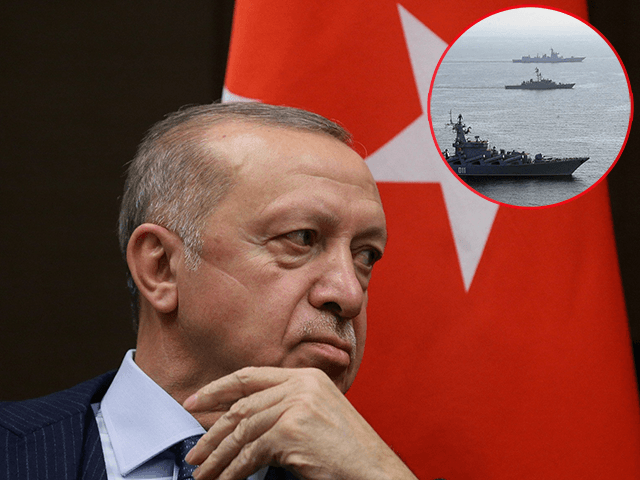
The government of Turkey changed its view of Russia’s attack on Ukraine over the weekend, declaring the assault is “officially a war,” which activated certain clauses in a treaty that allows Turkey to restrict access to the Black Sea through the Dardanelles and Bosporus Straits.
On Monday afternoon, Turkey announced it will forbid the passage of all warships through the straits.
Ukrainian President Volodymyr Zelensky asked Turkish President Recep Tayyip Erdogan on Saturday to close the straits to Russian warships. An excited Zelensky immediately announced Erdogan agreed to the request:
Turkish officials had previously disagreed, saying Erdogan had not yet made any decision “to close the straits to Russian ships yet.” Observers theorized Zelensky had either misunderstood what Erdogan said, or was using his public statements to pressure Turkey into closing the straits.
Turkish Foreign Minister Mevlut Cavusoglu rejected the idea of closing the Bosporus and Dardanelles to Russia last week. “Under the Montreux Convention on straits, Russia has a right to return its ships to its ports in Black Sea. Even in wartime, Russia has a right to do it,” he said.
The Montreux Convention is a 1936 agreement that gave Turkey control of the two vital straits, plus the Sea of Marmara. The Soviet Union demanded unrestricted access to the Black Sea before signing the agreement, while the United Kingdom wanted restrictions on the Russian navy’s ability to move between the Black Sea and the Mediterranean.
A complex compromise was reached, and adjusted several times over the ensuing decades, that gave Russia and other Black Sea nations the right to bring their warships “home” through the Bosporus and Dardanelles. The idea was to give those military vessels an unimpeded ability to “return to base,” unless Turkey itself was in a state of declared war with the Black Sea power in question.
In the current situation, Russia is using the Black Sea to attack Ukraine, so warships passing through the straits are not truly “returning to base.” Skeptics of the Russian war effort suspect Moscow would quickly file paperwork to reassign any and all vessels it wants to move through Turkey’s straits to “home bases” in the Black Sea, further abusing the spirit of the Montreux Convention.
It seemed unlikely that Turkey would invoke its discretionary powers under the Convention to block Russian warships, but Cavusoglu changed his tune on Sunday, using the magic word “war” that unlocks the restrictive powers of the 1936 agreement.
“In the beginning, it was a Russian attack. Now it has turned into a war. Turkey will implement all provisions of the Montreux Convention in a transparent manner,” he explained, suggesting Turkey’s view was different when the assault might have been limited to “a couple of airstrikes.”
“There should not be any abuse of this exemption. Ships that declare returning to their bases and passing through the straits should not be involved in the war,” he added.
“Turkey has good ties with Russia and Ukraine. Even as NATO members have hit Moscow with sanctions, any step too far by Ankara could harm its heavy Russian energy imports, trade and tourism sector at a time of domestic economic turmoil,” Reuters noted on Sunday, suggesting Turkey shifted its position under pressure from fellow NATO members.
On Monday afternoon, Cavusoglu announced the Montreux restrictions were now in force, and “both countries of the region and elsewhere” have been instructed “not to pass warships through the Black Sea.”
“We have decided to use the Montreux Convention to prevent the escalation of the crisis,” Erdogan said after meeting with his cabinet.
Turkey’s most feverish media supporter of President Erdogan, columnist Ibrahim Karagul of Yeni Safak, hammered out a 23-point explanation for why Russian President Vladimir Putin left Turkey no choice but to side with NATO and Ukraine against the Russian “Age of Madness.”
“Empires are making a comeback. Those with an imperial history are transferring their claims to the present and to the future,” Karagul wrote in Point 5 of his diatribe – a bold choice of words for a devoted supporter of the Turkish leader who constantly waxes nostalgic for the Ottoman Empire and sees himself as a potential new Sultan.
Erdogan clearly does not daydream about becoming the Black Sea janitor for Vladimir Putin’s new empire, as Karagul emphasized in his screed, cursing Putin for uniting Europe on a war footing and forcing Erdogan to choose between his European and Asian ambitions.
As is his wont, Karagul hurled some invective at the U.S. and U.K. for supposedly “provoking” Putin to attack Ukraine, but in the end he grudgingly conceded the war was Putin’s choice, and it could become very unhealthy for Turkey by turning the Black Sea into a “battleground” between Russia, NATO, and the United States.
“Putin’s statements on Ukraine and Russia’s invasion of the country revealed that he has similar intentions regarding Central Asian Turkic Republics. He additionally revealed that he does not consider long-term relations or normalization with Turkey,” Karagul concluded, conjuring some even more unhealthy scenarios from Ankara’s point of view.
https://www.breitbart.com/politics/2022/02/28/turkey-sees-threat-putins-ukraine-war-bans-warships-accessing-black-sea/
No comments:
Post a Comment